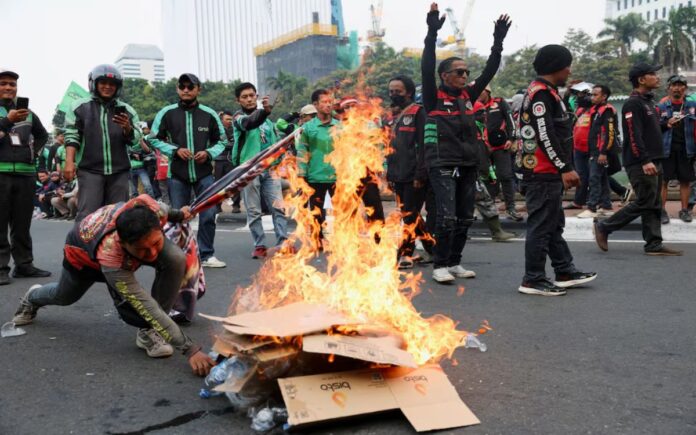Jakarta: More than 1,000 motorcycle taxi drivers launched strikes in various Indonesian cities on Thursday, protesting low wages and demanding greater protection from what they consider unfair practices by ride-sharing companies. The drivers are calling on the government to take action to ensure their rights and improve their working conditions.
Dressed in their signature green jackets, the drivers gathered outside the communications ministry and near the Jakarta offices of Indonesia’s leading technology company, GoTo, and Southeast Asia’s largest ride-hailing and food delivery firm, Grab.
Motorcycle taxis are a common sight across Indonesia, particularly in the congested capital of Jakarta, where traffic is notoriously bad. The strike led to some complaints on social media about slower service in the city.
Despite the protests, a spokesperson for Gojek, GoTo’s ride-hailing unit, said operations continued as usual and expressed openness to drivers’ feedback. Grab’s Indonesian unit, represented by public affairs chief Tirza Munusamy, stated that the company’s tariffs are designed to balance stable demand with fair earnings for drivers. However, Grab did not comment on whether the strike had affected its operations.
The striking drivers are demanding that ride-hailing companies increase their share of earnings from the current 80% per trip. They also want the government to grant them special employment status, which would give them more leverage in negotiating fees. Andi Kristiyanto, a representative of the National Online Taxi Coalition, which organized the protest, emphasized the need for better terms for drivers.
Also Read | Russia Intensifies Missile and Drone Strikes on Ukraine for the Third Time in Four Days
One driver, Wandi, shared his struggles, stating that despite working 10-hour days, he earns less than 150,000 rupiah ($9.73) most days—well below Jakarta’s minimum wage of 5 million rupiah ($324.5). “We want platforms to listen to us,” said Wandi, who only provided his first name.
GoTo and Grab, which offer ride-hailing, food delivery, and other services across Southeast Asia,, have a combined market capitalization of around $18 billion. However, they classify drivers as partners rather than employees, which exempts them from legal obligations such as setting minimum wages, providing social security insurance, or limiting working hours, explained Nabiyla Risfa Izzati, a labor law lecturer at the University of Gadjah Mada.
Also Read | Former Russian Defense Minister Arrested in Multi-Million Ruble Fraud Scandal
“It’s right to push the government so that it is the one that regulates the companies,” Izzati said, stressing the need for government intervention to set minimum and maximum fees across the ride-hailing and food delivery industries.
While Indonesia’s manpower ministry did not immediately respond to requests for comment, the transport ministry stated that it does not regulate fees and urged platforms to consider drivers’ concerns.



